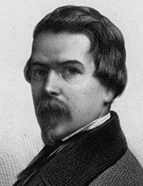

The Herodotean temptation gradually took shape as his research grew increasingly professional, keeping pace with the rhythm of his movements. Therefore, in order to understand Varnhagen, through his works and his copious correspondence, we must not lose sight of the fact that this is a discourse that comes from the past rationalised by the author; there is no carelessness in it, his controversies, sometimes acrimonious, are mostly contained to academic disputes. Even when control over his words seems to slip, his attacks reveal themselves as defences of his character. Perhaps it's no exaggeration to say that much of what we know about Varnhagen from his writings is a bit of what he wanted us to know about him. He was concerned about his life and his posterity. This caution, however, was not only insufficient to prevent the creation of an unfavourable image around him but seems to have exacerbated it. Yet, despite his personality's lack of charm, he succeeded in asserting himself, making himself indispensable and irreplaceable. Even for those who dislike him (and they do not seem to be few, either in the past or present), he has become an indispensable figure for understanding the history of historiography in Brazil and its connections with Portugal.
Thus, after various visits to libraries and archives, at the beginning of 1877, Varnhagen
finally published the second edition, revised and expanded, of the História geral do Brasil . An episode narrated in it is, in a way, responsible for his last trip to Brazil. In the chapter dedicated to the occupation of Rio de Janeiro by the troops of the Frenchman Duguay-Trouin, the historian states that "the first lesson we should learn" is that the capital of the empire could no longer be based in the city of Rio de Janeiro. Since its Memorial orgânico [Organic memorial] , 1849, the subject had been on his mind. In order to resolve the problem as quickly as possible, he asked the government for a six-month leave of absence and left for Brazil. On his return to Vienna, he writes a specific booklet on the subject: A questão da capital: marítima ou no interior? [The issue of the capital: maritime or inland?] In this short text, Varnhagen takes up the considerations he had made on the subject in the new edition of the Historia geral [General history]: "When these lines were published, the very tone of conviction they conveyed caused our timid conscience to tremble at the weight of the responsibility assumed in such a work before posterity. It dawned on us that we wouldn't be reassured until, through our own eyes and to posterity itself, whether or not we were right in all our plans and proposals drawn up on paper in the silence of the office." In Brazil, he travelled once again to the region where he was born. Afterwards, he headed towards Goiás. Work and sacrifice dictated the pace of the intrepid researcher's activities: "We undertook (taking with us the competent instruments, including no less than three barometers) a painful journey on horseback, no less, to the province of Goiás, along our primitive roads, to by sight and as a former engineer, to recognise this remarkable stop that contemplation and study of the best maps had revealed to us". ( História geral [General history], 1877, pp. 12-13) In order to know, recognise, and thus replenish one's descriptive capacity, it is first necessary to see, but with sharp, judicious, we could say scientific, eyes, like those of an "old engineer", trained in the former metropolis. The result is explanations that show how the situation in deep Brazil had not changed much since the journeys of John Mawe, Spix and Martius, Neuwied, and Saint-Hilaire, among others, during the years 1810-1820. Despite the difficulties of the itinerary, the historian assessed its results as fruitful. He not only affirmed the favourable location for the establishment of the new capital, which he believed was "well supported by geographical data", but also deemed the region suitable for European colonisation, a cause he tirelessly promoted. Before returning to Europe, he travels through Bahia. Varnhagen wanted to visit Porto Seguro and Ilhéus.
This work is financed by national funds through FCT - Foundation for Science and Technology, I.P, in the scope of the projects UIDB/04311/2020 and UIDP/04311/2020.
